Inside: Consider adopting some of these life-changing minimalist habits, even if you don’t consider yourself a minimalist.
Minimalism has become an attractive lifestyle for many in a world that has focused on excess.
The philosophy of embracing simplicity, intentional living, and a meaningful life that doesn’t rely on accumulating physical stuff sounds tempting to many.
In today’s constantly on, overwhelming modern world, the thought of taking a step back and embracing a more simple existence can be a breath of fresh air for some – but for others, it isn’t as appealing.
And that’s fair – minimalism isn’t a fit for everyone. Still, you can benefit in a big way from some minimalist habits, even if you don’t consider yourself a minimalist.
Not sure what that looks like? Here are a few life-changing minimalist habits you can adopt – even if you aren’t a minimalist.
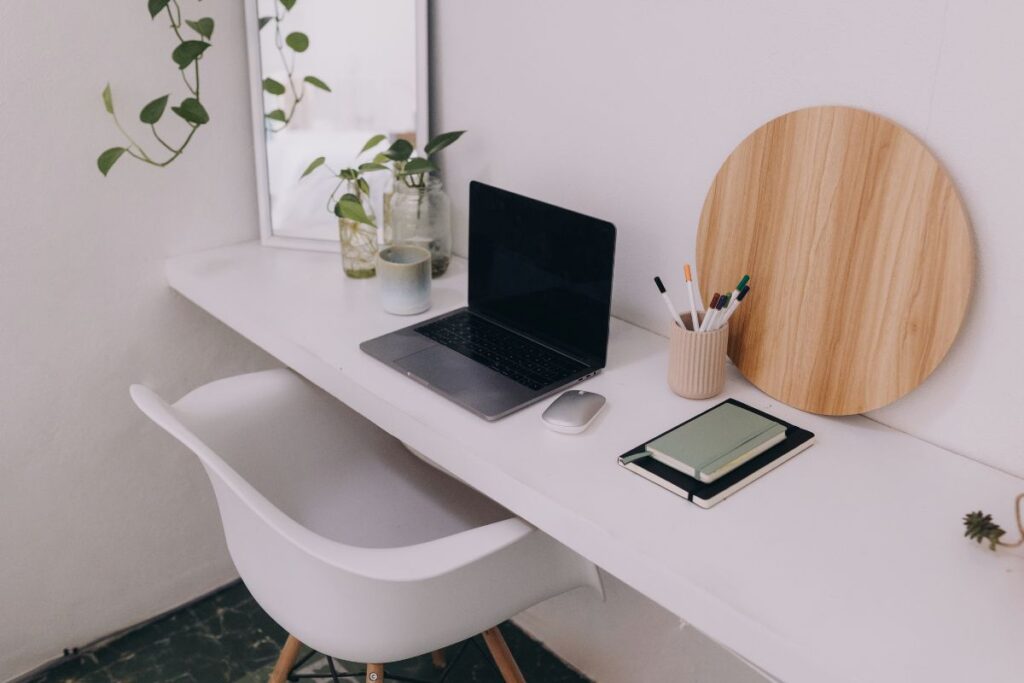
7 Minimalist Habits That Can Change Your Life
These minimalist habits can have a positive impact on your life even if you don’t consider yourself a minimalist (I prefer to focus on simplicity instead).
Here are the minimalist habits that can benefit everyone.
1. Embrace a simple morning routine.
What does your morning routine look like today? If it starts with snoozing your alarm three times and ends with you frantically scrambling around your house, getting ready for your day, you could benefit from a more minimalist approach.
A simple, intentional morning routine can set the tone for your whole day – and you might be surprised to see how much of an impact it can make.
When you start your day in a high-stress, anxious mindset, that energy carries over as you go to work, school, or handle whatever obligations are on your plate.
Similarly, if you start your day calmly, giving yourself plenty of time and focusing on accomplishing only one or two mindful tasks throughout the process, you’ll find yourself in a much better place to accomplish your goals.
Your simple morning habits might involve a quick meditation or stretch session, or a walk around your block with a cup of coffee in your hand to get some fresh air.
Or it could involve reading a chapter of a book, or putting on your favorite playlist as you do your skincare routine.
The key? Keep it simple and focus on meaningful activities that give you energy and bring you joy.
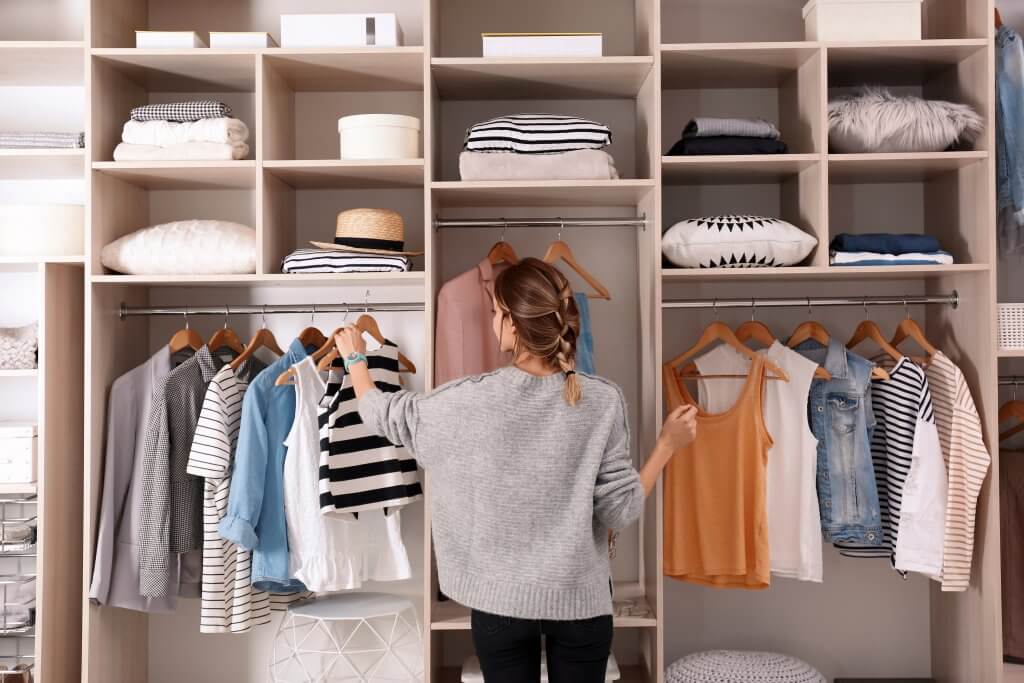
2. Simplify your wardrobe.
You might not realize it, but your overstuffed closet filled with an endless assortment of clothes might be stressing you out – even if you think you love it.
How many times have you spent way too long getting ready in the morning because you couldn’t find the exact shirt or pants you wanted among the clutter? How often do you try on outfit after outfit, trying to decide what you actually want to wear?
Embracing a more minimalist wardrobe can solve all of those problems while still letting you show off your personal style.
But how do you do it?
First, you declutter your closet. Pick one type of clothing at a time to sort through and ruthlessly declutter. Remove items that don’t fit, that you don’t feel great in, or that you simply don’t like.
By getting rid of the clothes you don’t need, focusing on the pieces you love, and potentially supplementing your wardrobe with a few versatile items to fill any gaps (if needed), you can take the stress and energy out of the process of getting dressed each day while still loving what you’re wearing.
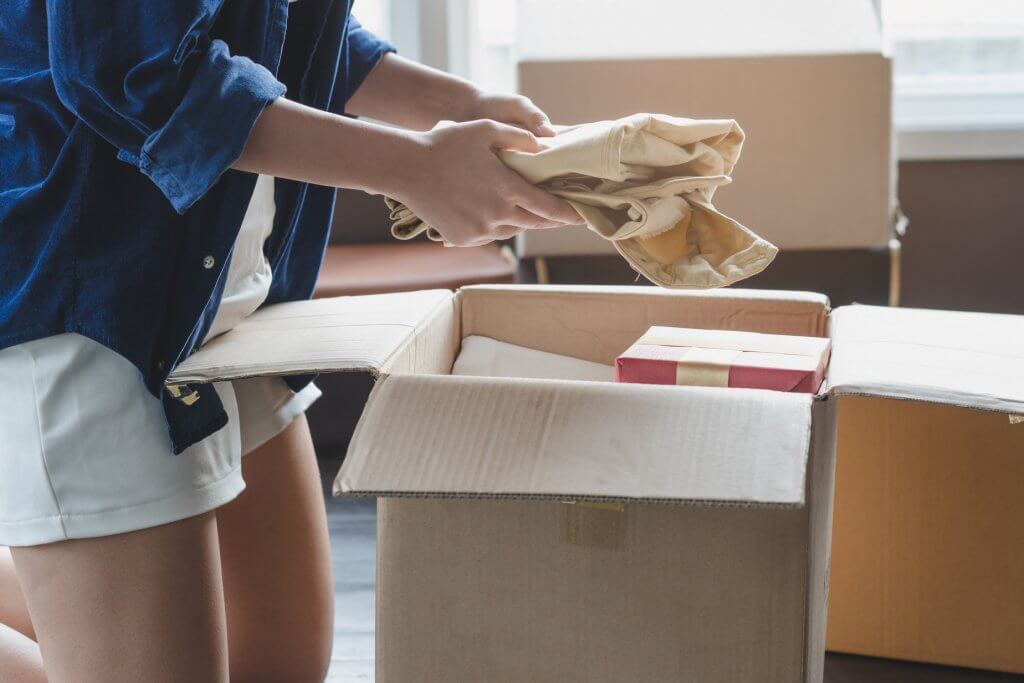
3. Declutter your home regularly.
When you think of minimalism, the concept of decluttering is often quick to come to mind. Getting rid of the physical stuff you no longer need – beyond just the clothes in your closet – is a key component of embracing a minimalist lifestyle.
And it’s easy to see why.
When you live in a space filled with too much stuff, it can take a surprising toll on your well-being – physically and mentally. All of that stuff makes it difficult to stay clean, giving dust and dander virtually endless places to accumulate.
The physical presence of clutter can cause stress and anxiety, inhibit our creativity and decision-making skills, and more – even if we don’t realize it.
By creating decluttering habits and removing clutter from your home on a regular basis, you keep things neat, clean, and organized. You make it easy to find the things you need by eliminating the stuff that doesn’t really serve a purpose or bring any joy.
You don’t have to get rid of everything. It’s really about finding the right amount of stuff for you and your home. You can have a home that is both cozy and simple. It just takes effort and intentionality to get there.

4. Shop mindfully.
The concept of shopping mindfully goes hand in hand with maintaining a clutter-free space. By cutting down on the amount of stuff you’re bringing into your space, you keep it clean and decluttered.
To be clear, this doesn’t mean you can’t buy anything at all. Instead, it’s all about being more intentional with shopping.
Curb those impulse buys and thoughtfully select the clothes, furniture, decor, books, and other stuff you bring into your home.
By researching your options and making smart decisions, instead of quickly buying the first thing that comes to mind when a need arises, you’ll set yourself up for success down the road.
This also means focusing on quality instead of quantity. By investing in items that you can keep and use for the long run, instead of the most affordable, instantly available thing you can find, you’ll find yourself surrounded by quality pieces that you love – instead of a bunch of random items.
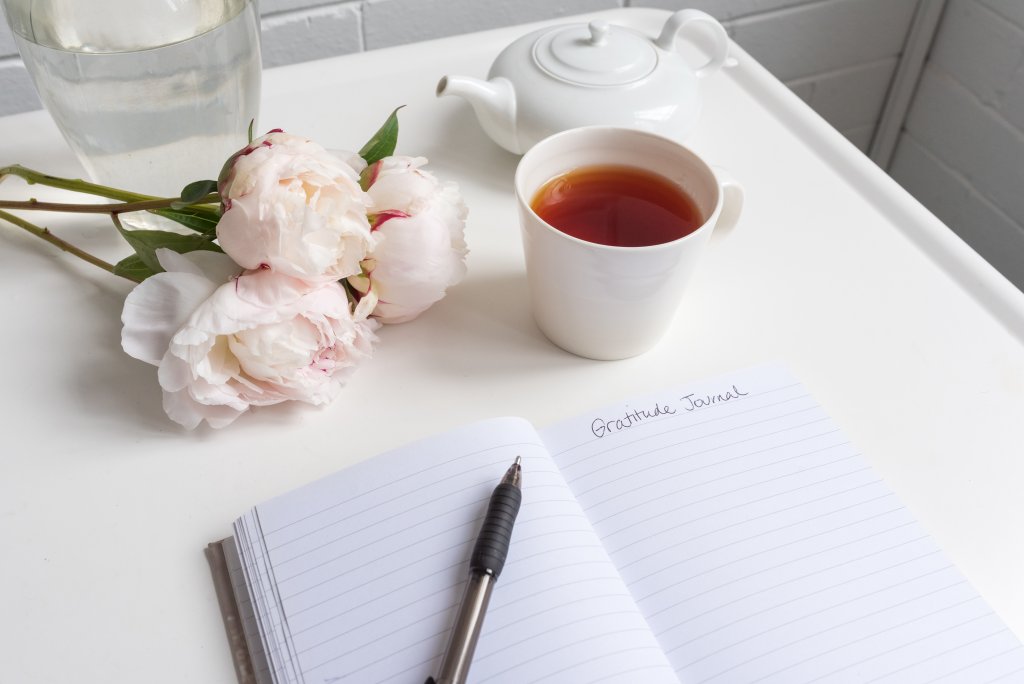
5. Practice gratitude.
A key component of minimalism, at its core, is practicing gratitude for the things you have instead of constantly chasing more.
But gratitude is something that everyone can benefit from regardless of whether or not you consider yourself a minimalist.
By focusing on the blessings in our lives, big and small, we cultivate a sense of appreciation and joy that lifts our spirits and helps us embrace a more positive perspective, even when we face challenges.
The best part? Practicing gratitude doesn’t cost anything at all and only takes a few minutes out of your day.
You can start a gratitude journal by writing down a few things you’re grateful each day for in a notebook, or you can think about one or two things you appreciate while you’re brushing your teeth or heading to work.
It might not sound like much, but you’ll be surprised to see just how much of an impact it can make in your life.
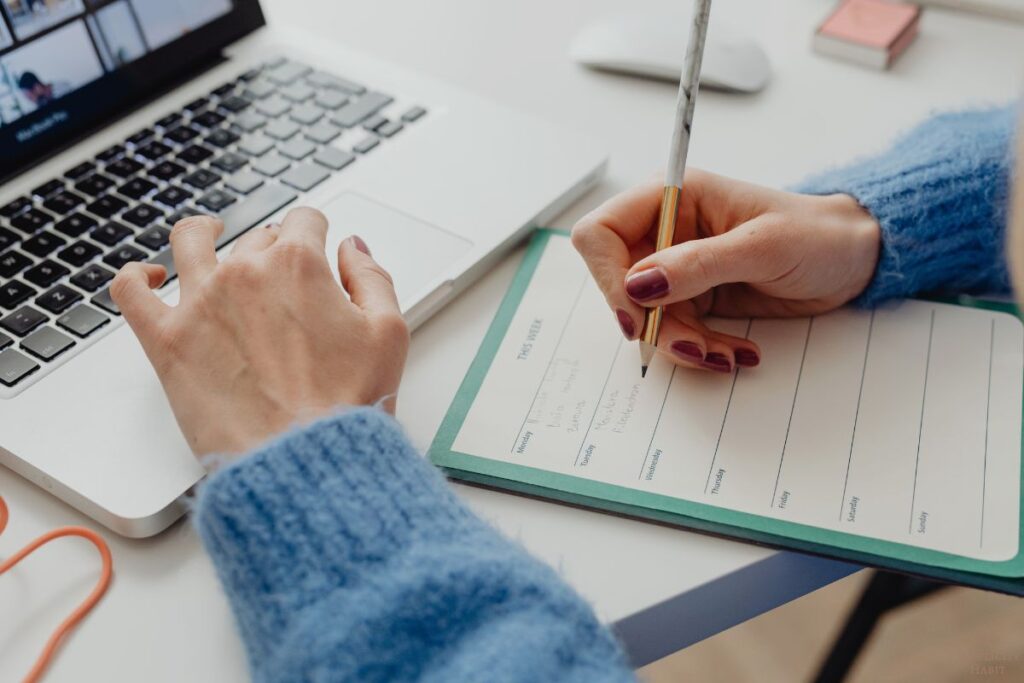
6. Use your yeses wisely.
Living simply isn’t about only owning less stuff. It’s also about being purposeful with your time.
Minimalists strive to prevent clutter in their calendars and declutter their schedules as needed.
They use their yeses purposefully and selectively. Simple living embraces rest and encourages a slower pace.
Resisting the urge to overcommit or pack your schedule enables you to be more intentional with relationships. When you have more time available you can be there for family members or friends when you want or need to be.
Using your yeses wisely allows you to have the freedom and flexibility that you wouldn’t have otherwise. You can decide to do spontaneous outings because you aren’t constantly busy running from one thing to the next.
Minimalists intentionally choose to become unbusy and that’s something we can all benefit from.
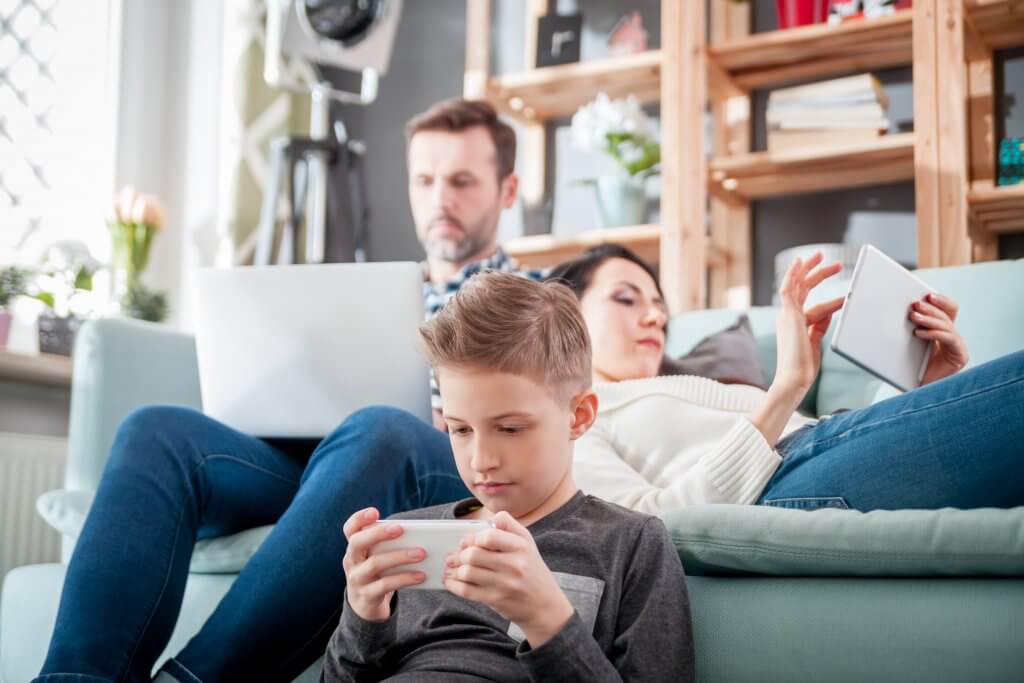
7. Use technology intentionally.
The final minimalist habit that everyone should consider is being intentional with the use of social media, devices, and the use of technology.
We are impacted both positively and negatively by the recent advances in technology. While they have made some things easier, they can also become another magnet for clutter.
Minimalists regularly get rid of digital clutter. It helps to save time and limit distractions which is helpful for everyone.
Being intentional with technology also means being mindful of when and how you use it. Consider the ways it is influencing your thinking and behavior. Is it helping you or is it stealing more of your time than you’d like?
By critically assessing the pages and people you follow, and the articles and videos you click on, you can drastically improve the content you’re consuming online.
Creating healthy boundaries with devices and limiting screen time is also crucial. Kids learn by example so reflect on what you’re teaching them.
Adopting this one minimalist habit could help improve your mental health, your relationships, and get you a lot more time back to spend on other things.
What minimalist habits would make a big difference in your life? Leave a comment and let me know what you think!
Sign up on the form below to get weekly decluttering tips and inspiration sent straight to your inbox. You’ll also get the free 5 Areas to Declutter in 10 Minutes Checklist to help you get started decluttering today.


Have recently relocated to a new Country. Have downsized majorly.
Looking for ideas to decorate WARM MINIMALIST.
You might like some of the tips in this post: https://www.thesimplicityhabit.com/hygge-and-simple-living/
The declutter item resonates loud and clear with me. I am a procrastinator. Putting things off is how the clutter begins.
Hi there. 3 years ago I was living in my condo in Orlando with 70 years of accumulated possessions and feeling stressed.
I let go of everything that wouldn’t fit in my car, and now live with my dog on a lake in a tiny house I bought. I’ve gone back to my love of nature. I only have one or two of anything, no multiples or duplicates. I have created my own heaven on earth. I am so grateful for what I “have” now. And although I’m not religious I feel blessed. Love is the answer to everything ♥️. Thank you for this site!
My adult daughters help the planet by refusing to wear clothes that aren’t second-hand. I don’t think I could go this far but they’ve taught me a lot about reuse and recycle philosophies and I try to cut down on clothing purchases (I’m a lawyer so lots of court clothes) by wearing a lot of black and white. I always have room to learn more!
I think you should ask everyday what you Need instead of what you Want. Be it in shopping, people, chores, and to highlight the top priority activities on the schedule. It’s not wrong to include less responsibilities because whatever you think is important will take the energy, time and effort out of the way of the most important stuff
My mother had a easy way to declutter.When a stain wouldn’t come out of something it was out in the donation bin. Spend 15 mins in each room carry the bin and grab all the stuff no longer wanted. She did this weekly and clutter didn’t build up.
Putting stained items in the donation bin is insulting to those in need. Please only donate things that you’d be willing to wear yourself, then find out where you can recycle stained things in your area. Thanks!
It depends on where you’re donating to. If it was towels for an animal shelter, stains would be ok. Or if it is a donation center that recycles textiles that would be ok too. But you’re right, not ok if they’re looking only for pieces in good sellable condition.
I was told at several charities that stained items are welcomed as they can be sold by the pound and that extra oncome can offset utility or other expenses.
Similarly, military charities welcome single shoes or socks as they can be used by amputees.
I am 65. I’ve retired from a demanding position, and over the years I’ve been collecting craft material for “when I retire”. I also have a 10×10 room of tubs full of photos! I recently moved from my home of 34 years, and managed to clear out MOST of my kids belongs. My best friend passed and left a house full of stuff, my mom had 2 large homes of “stuff”, that I am gradually trying to empty out. So much of it is photos, memento’s and passed down family treasures. My boys seem generally disinterested in most of it, and they don’t have room for a lot- they want mom to keep it. So, I am finding myself drowning in things that have true meaning, may be wanted by my sons when they are married and have a home, or I might use during my next move. I have a beautiful home, but most of my antique treasures don’t look right in it. I’m appalled at what quality wood furniture is selling for vs IKEA. I make a little headway each day, but I’ll be gone before I can get organized.
I feel for you with your meaningful possessions needing to be housed in a safe place while the necessary decisions are made. If you have items with a background story attached, hand written note, your children may be more interested and if not a local museum. My father’s hand made wooden furniture and wood turned vases were not appreciated by some family members and I have the most special pieces but some will have to be donated perhaps to a woodworking group who can at least use the wood. It is a hard and long process but keep going and I will know that you are also getting on with this important work as I sort my family’s belongings. Take care of yourself with regular breaks in nature, get some sunshine and fresh air. Best wishes to you.
This sounds wonderful!! However, here’s a tip from a 88-year-old woman. Don’t forget to factor in real life happenings. For example, I had my carpet cleaned yesterday. This morning my cat threw up … not once, not twice but 3 times on my clean carpet!!! I’m 88 years old and I have been a single working mom. So please allow for real life!!
Well, I have downsized often over the last several years, simplifying so my daughter doesn’t have a hard job when I finally pass away. Every time she visits it’s more and more streamlined and she says she likes it. I gave away so much that people asked if I was moving. I’m still not done… All the baking equipment and supplies are gone, and the extra makeup 💄 that I don’t use is tossed, as well as ongoing clothing donated in perfect condition. Tossing some books and donating others, giving away the beautiful Chrystal that no one wants to inherit are some things that come to mind. It’s kinda fun!
I don’t want to be a total minimalists because I love to have things that are very special out what is the word thats up from minimalist thanks
Irrespective of orientation of FAITH, an intentional prayer time with openness at heart, will make someone more gracious to people and adaptable in life while changing to fit and accept.